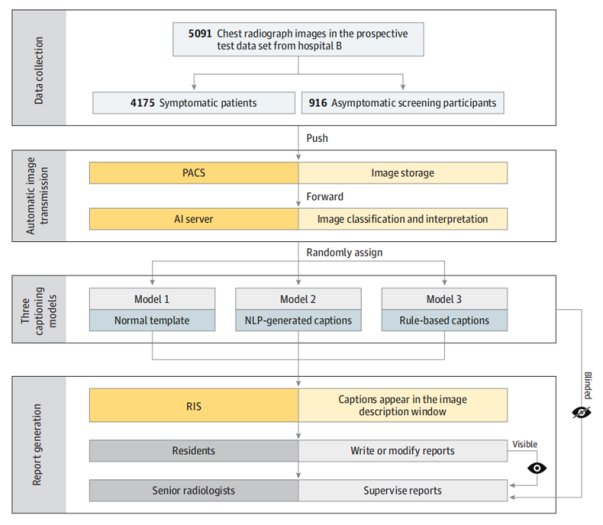- News
BERT Natural Language Processing Study Conducted by Xueqian Xie's Team in the Radiology Department at Shanghai General Hospital Published in JAMA Network Open
Link of the original article:
https://mp.weixin.qq.com/s/Aubn0F1W5Zum4nGLnNIEKw
In recent years, the bidirectional encoder representations from transformers (BERT) in artificial intelligence-based natural language processing (NLP) has been rapidly developed and can generate medical reports. Professor Xueqian Xie's research team in radiology department at Shanghai General Hospital collected a large number of chest radiograph cases, used NLP to automatically annotate the training set of chest radiograph based on the original reports, trained convolutional neural network (CNN), and automatically generated diagnostic reports by NLP. The study showed that the reporting time of NLP-generated report was significantly shorter than that of a normal template and rule-based model. This study has been published in JAMA Network Open (IF=13.353), a sub-journal of JAMA.

The retrospective training data set of this study consisted of 74 082 chest radiograph cases. Among the 5,091 cases in the prospective test set, NLP was used to generate free-text descriptive captions, providing priori information for writing report. The results showed that the NLP-generated report mode shortened report writing time and was the most similar to the final report, with a bilingual evaluation understudy (BLEU) score of 0.69, significantly higher than 0.37 of the normal template and 0.57 of the rule-based model.
Chest radiography is a commonly used radiological examination for screening and diagnosing cardiac and pulmonary-related diseases, accounting for 26% of imaging examinations of cardiac and pulmonary diseases. Especially in community clinics or primary hospitals, CXR is the most commonly used imaging tool for chest diseases. However, the interpretation of CXR relies on the expertise of radiologists, and primary hospitals often lack experienced radiologists. This study can improve the diagnostic ability of common or critical diseases such as pneumonia, lung nodules, and pneumothorax in primary medical units, providing a new tool for diagnosing chest diseases and improving clinical efficiency.

It is reported that Shanghai General Hospital has been jointly approved jointly by the General Office of Ministry of Industry and Information Technology and the National Medical Products Administration as the "Clinical Trial Center for Artificial Intelligence-assisted Diagnostic Medical Device", and has been approved by the Shanghai Science and Technology Commission as the "Shanghai Artificial Intelligence-assisted Diagnostic Medical Device Clinical Evaluation Platform". The center is responsible for conducting clinical trials of various imaging artificial intelligence-assisted diagnostic devices and products to assess their safety and effectiveness. At present, the center has established a standardized SOP for database construction, and "personalized database construction SOP" has been formulated for different diseases in strict accordance with the universal standard for practice. The center's database covers many characteristic diseases such as coronary heart disease, lymphoma, and carotid artery plaque, which can provide abundant trial data for imaging artificial intelligence-aided diagnosis projects and help researchers to conduct in-depth investigation in this field.
Correspondent: Lingyun Wang, the Department of Radiology, Yang Hu, the Department of Publicity, Shanghai General Hospital
Editor: Shishi Cai, the Department of Publicity, Shanghai General Hospital
